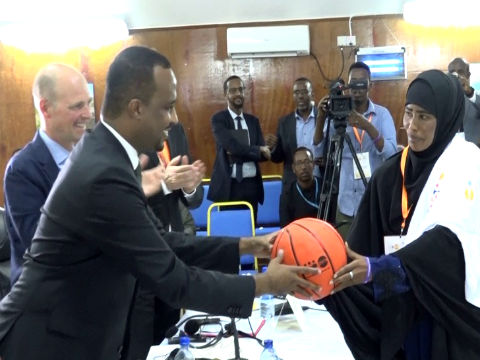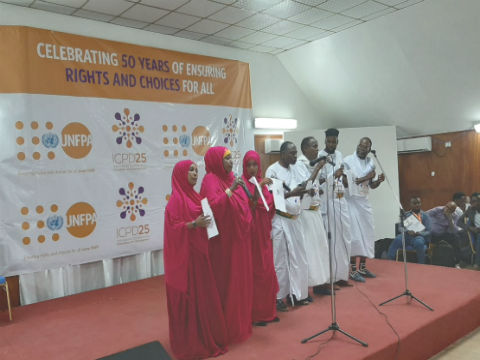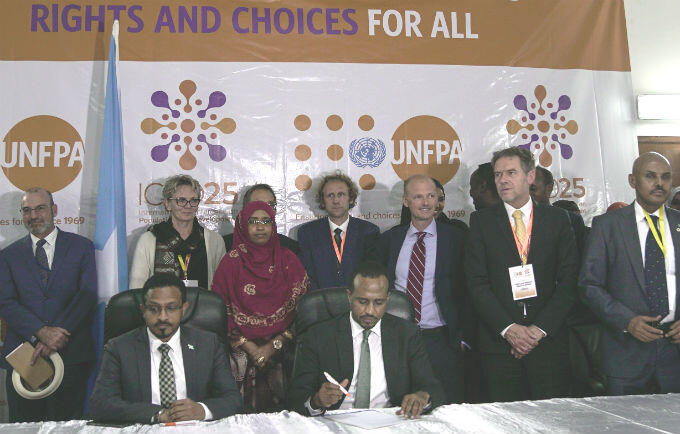The Federal Government of Somalia (FGS) on 16 October 2019 committed to reducing the overall maternal mortality rate across the country by no less than 25 percent by 2030 through the training and employment of 1,000 additional midwives. The Government also reaffirmed the need to accelerate progress towards achieving universal access to quality sexual and reproductive health services for all.
“Ultimately, the Government will strive for zero preventable maternal deaths in Somalia. To achieve this ultimate goal, the Government commits to integrating comprehensive interventions on the reduction of maternal mortality into the national strategies, policies and programs,” stated the Minister of Planning, Investment and Economic Development of the Federal Republic of Somalia His Excellency Gamal Mohamed Hassan.
The Minister was speaking in Mogadishu at the High-Level National Event where he signed Somalia’s Statement of Commitment for ICPD25. This year marks the 25th anniversary of the groundbreaking International Conference on Population and Development (ICPD), which took place in Cairo in 1994. At that conference, 179 governments adopted a Programme of Action, recognizing that reproductive health, women's empowerment and gender equality are the pathway to sustainable development.

Female basketball player calls for an end to harmful cultural practices
From 12-14 November, the governments of Kenya and Denmark and UNFPA are co-convening the Nairobi Summit on ICPD25, a high-level conference to mobilize the political will and financial commitments the world urgently needs to finally and fully implement the ICPD Programme of Action. These commitments will be centred around achieving zero unmet need for family planning information and services, zero preventable maternal deaths, and zero sexual and gender-based violence (GBV) and harmful practices against women and girls.
The FGS, in line with the Somali Women’s Charter, has also committed to zero tolerance for GBV and FGM by addressing vulnerability factors and through strengthening its policy and legal frameworks such as the Sexual Offences Bill (SOB) and FGM elimination policies, equipping officers with necessary resources enabling them to adequately respond to GBV cases by 2030. “In this regard, the Government commits to tackle core vulnerability issues in vulnerable communities, especially those in Internally Displaced Person (IDP) settings to prevent GBV cases from further exacerbating their plight,” stated H.E. Hassan.

A band performs the Somali ICPD25 song
He also said that the Somalia Government recognizes the impact of population dynamics, reproductive health and gender on poverty, and considers women’s empowerment not only as a means of eradicating poverty, but also as a prerequisite for achieving the aspirations of the National Development Plan (NDP9) and the Global Sustainable Development Goals.
“Our Government supports the demands made by Somali women and girls in the Somali Women’s Charter. In line with the Charter, we acknowledge and commit ourselves as a Government to pay special attention to the education of young boys and girls and achieving gender parity at all levels of education,” said the Minister.

H.E. Hassan shows the commitments document to the people at the event
The ICPD25 event in Mogadishu brought together hundreds of people including government officials, ambassadors from Denmark, Sweden and Italy, donor countries, UN agencies, civil society and youth groups including girls’ sports groups.
The ICPD25 Summit in Nairobi aims to bring everyone together: heads of state, ministers, parliamentarians, thought-leaders, technical experts, civil society organizations, grassroots organizations, young people, business and community leaders, faith-based organizations, indigenous peoples, international financial institutions, people with disabilities, academics and many others interested in the pursuit of sexual and reproductive health and rights.
– Pilirani Semu-Banda
-------


